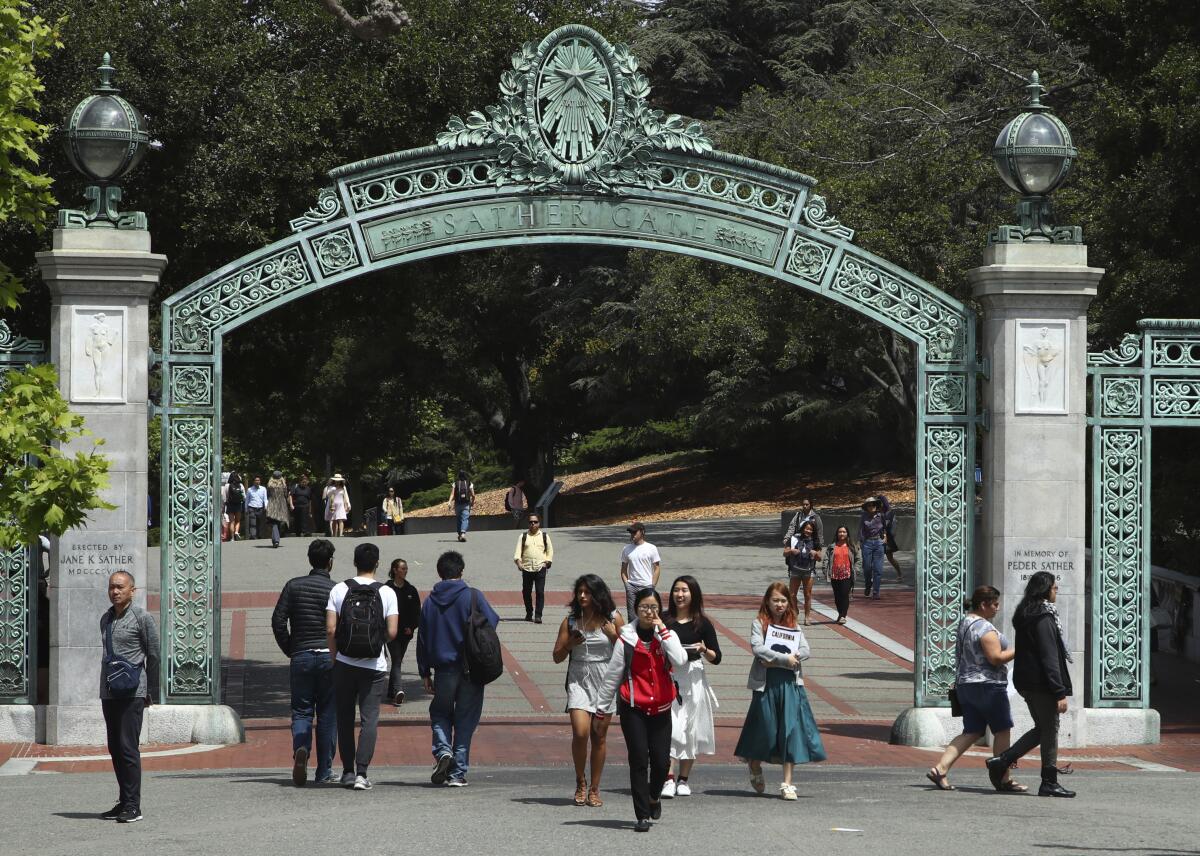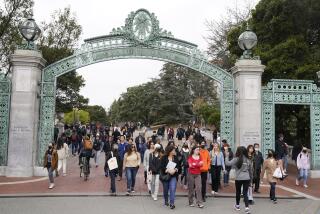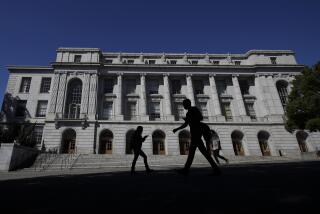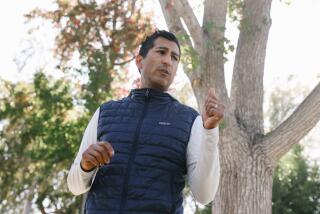Defund or reform UC campus police? Sharp disagreement surfaces

Should University of California campus police be reformed or defunded?
The question is at the heart of a sharp disagreement that surfaced Tuesday during a UC symposium — part of an effort to “reimagine” campus safety following demands for racial justice after the police killing of George Floyd last year.
The chasm was evident when some critics skewered the meeting for lopsidedly focusing on how to improve policing rather than exploring ways to replace it with alternatives.
Both the UC Academic Senate Council, composed of faculty leaders at all 10 campuses, and the UC Student Assn. have called for disarming and substantially defunding campus police, proposing instead that those resources be redirected to support marginalized students and to study and develop other methods of campus safety. Several coalitions promoting those views have formed, including Cops Off Campus and the DIVEST/INVEST UCLA Faculty Collective.
Those voices, however, were not fully represented in the five-hour forum that featured university leaders, outside experts, a UC police chief, faculty, staff and students. The issue is roiling campuses across the country and at UC, where police came under intense scrutiny for pepper-spraying peaceful protestors at UC Davis in 2011, during student demonstrations against tuition hikes and more recently, turning out in force against UC Santa Cruz graduate students demanding higher pay.
“As a 20-year UC Professor and Senate Chair, I am disgusted by how this forum has been framed,” Dylan Rodriguez, a UC Riverside faculty member who supports eliminating campus police, wrote in the chat.
UC President Michael V. Drake, however, pledged that the university aimed to make a real change.
Drake, the university’s first Black president in its 150-plus-year history, shared his experiences with outside law enforcement starting with how he was first stopped by officers as a teenager “for no reason.” Such racial profiling continued year after year — most recently about six years ago when he was UC Irvine’s chancellor on his way home. He was detained by law enforcement officers for 15 minutes, treated rudely and “verbally threatened ... for no reason, with no outcome, with no charges, with no problem” but was sent a form letter months later saying the stop was justified.
“We are not looking for band-aid solutions to specific incidents, but rather fundamental, long-lasting change,” Drake told the virtual forum. “We have an incredible opportunity to reimagine what it means for all members of our community to be safe and secure on a UC campus, and to become a national model for other colleges and universities.”
UC Board of Regents Chair John A. Pérez also detailed his own abuse at the hands of police, beginning as a junior high school student when he said he was walking home with friends and stopped, handcuffed and thrown to the ground without ever being told why. Years later, a month before he was elected to the State Assembly, he was again stopped, handcuffed and detained.
Pérez, however, said he did not believe abolishing campus police is the answer. “I do believe pushing back on tactics based on escalation and militarization and unnecessary force is,” he said.
Both Drake and Pérez noted that many police officers are well-intentioned public servants who have protected them and the campuses — although the board chair acknowledged that he struggles with the “duality of how well I am treated when I am a known individual with perceived power and status and how poorly I’ve been treated when I am a nameless brown face.”
UC Davis Police Chief Joseph Farrow spoke about reforms taken after the pepper-spray incident, which have been recognized as some of the UC system’s best practices.
The 10 UC campuses operate their police departments separately with 470 officers across the system — UCLA has the largest force of 65 — with budgets that collectively total $136 million, according to 2020 UC data. A 2019 UC policing task force report found that the number of complaints about officers was “very low,” use of force incidents were “minor” and surveys at three campuses found satisfaction very high. But skeptics question UC police data, saying they are not adequately disclosed.
A separate gathering to watch the meeting of about 35 students, faculty and others who support defunding police peppered their own chat box with a steady critique of the forum. They questioned why UC organizers chose the speakers they did, and why research on practical alternatives for community safety and the ineffectiveness of racial bias training was not presented.
Two of the 13 speakers — both from UC Riverside — drew collective praise from the watch participants: Naomi Waters, a student leader with the UC Student Association’s racial justice initiative and Mariam Lam, the campus vice chancellor for diversity, equity and inclusion. Lam noted that policing as most visibly practiced at UC — patrolling and surveillance by armed law enforcement, which prioritizes security, discipline and punishment — triggers anxiety in many marginalized students and is rooted in a history of anti-Black racism.
“This practice ... is one that appears antithetical to the UC academic mission,” she said.
Waters, in a separate interview, said many students want armed police off their campuses and are fed up with more than a decade of UC task forces and studies about the policing issue — most recently, a report released last June that issued recommendations about training, community engagement and use-of-force policies.
“They’ll task force you to death but nothing salient is being done,” Waters said. She added that she would prefer that campus violent crime, which is relatively rare, be handled by municipal police as needed rather than a 24/7 armed police presence on campus.
The UC student organization is demanding more transparency about data on police stops and use of force, the disarming and defunding of police so scarce budget dollars can be used for other student needs and an analysis of what police actually spend their time doing. Dealing with protests, building lockouts or mental health issues, for instance, can be handled by trained university staff, said Aidan Arasasingham, UC Student Assn. president.
Rodriguez, the UC Riverside professor, said UC should investigate the abundant research and real-life examples of collective and community forms of self-defense — walking in groups, for instance, or using phone trees.
Even in the case of violent crime, he said, there is no empirical evidence that a police presence is a deterrent. In several documented cases, he said, “ordinary people” have prevented violence.
A UC spokesman said symposium organizers took care to present different viewpoints on campus policing, including voices to discuss disarming and defunding police. The Tuesday event will be followed by another forum next month highlighting campus reports on their own practices. UC officials hope to create systemwide guidelines on new campus safety protocols.
More to Read
Start your day right
Sign up for Essential California for news, features and recommendations from the L.A. Times and beyond in your inbox six days a week.
You may occasionally receive promotional content from the Los Angeles Times.







